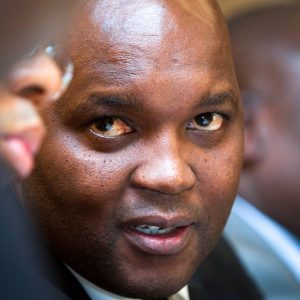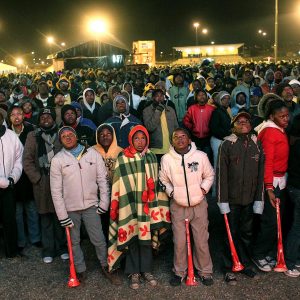2010 World Cup was an African Renaissance project
The first Fifa World Cup on African soil was more than just a sporting exercise, it was an opportunity to align Brand Africa and show the world what the continent is capable of.
Author:
6 July 2020

Then president Thabo Mbeki scanned the room for a few seconds, took a deep breath and fixed his eyes on his speech. He spoke for exactly nine minutes and 17 seconds, occasionally making eye contact with the Fifa executive members sitting in the front row.
It was 14 May 2004 in Zurich, Switzerland. The room was full of sports personalities, Nobel Prize winners, heads of state, former Fifa Players of the Year and other influential members of society. Mbeki was the salesperson tasked with delivering the pitch on behalf of Brand South Africa to the Fifa executive members. It was this group that would decide, in less than 24 hours, if South Africa would host the first ever football World Cup on African soil.
Halfway through his speech, Mbeki had the room eating out of the palm of his hand. The man who had delivered his famous “I am an African Speech” only a few years earlier had turned the packed room into a United Nations general assembly hall where he was calling, passionately, for Fifa to give the 2010 World Cup hosting rights to South Africa and fulfil the dream of an African Renaissance. The South African president understood the power, influence and reach of football.
By granting South Africa hosting rights for the world’s greatest footballing showpiece, Fifa would be healing years of “slavery, colonisation, apartheid, genocide” – Mbeki’s words.
More than a football tournament
It was a curious choice of words, delivered in a room filled with silence and tension. But Mbeki – like the men who had criss-crossed the world fighting for South Africa: then Safa president Molefi Oliphant, Irvin Khoza who was serving as chair of the Local Organising Committee (LOC) and Danny Jordaan who was chief executive of the LOC at the time – was aware of the historical significance of the moment.
He reminded the room that, “This [the journey to host the World Cup] is an African journey of hope – hope that with time, we will arrive at a future when our continent will be freed of wars, of refugees, of displayed people, free of tyranny, racial, religious and ethnic tensions and conflicts, of hunger and the accumulated weight of centuries of denial of our dignity.”
Related article:
Hosting the Fifa World Cup would “provide the biggest global stage whereby nations and people of the world come together to reaffirm our common humanity … that we belong to one human family regardless of colour and race”.
From the onset, the 2010 Fifa World Cup was designed for a cause bigger than just 90 minutes of football. It would be a public relations exercise and a real-time exhibition of Africa to the rest of the world.
Therefore, the biggest legacy of the tournament was always going to be about repositioning Brand Africa, that the world must trust Africans and that Africans must trust themselves.
From glory to building blocks
Hosting a World Cup in Africa – a place that The Economist magazine described not so long ago as “the hopeless continent” – would require more than bricks and mortar. While there was polite applause after the announcement from across the globe, the spotlight soon shifted to Africa as questions were raised about whether or not the Africans would be capable of organising Fifa’s flagship tournament.
Although South Africa already had (some) infrastructure to kick-start the project, compared with previous hosts, the country had a handicap in both perception and reality. New stadiums needed to be built. Road and infrastructure improved. Telecommunication needed to be overhauled and given a facelift. Crime rates remained the topic on everyone’s lips.
In 2008, just as the 2009 Fifa Confederations Cup approached, there was a setback. Nelson Mandela Bay Stadium, one of the venues for the dress rehearsal, was not ready to host and subsequently had to be removed from the 2009 event, giving it more time to be completed. This gave the international media something to talk about and validate their doubts. In reality, this decision was more of a precaution as, if pushed, the stadium would have hosted the event.
A choir of non-believers
If Fifa thought the biggest hurdle would be to convince the world that South Africa (and Africa) was capable of hosting a World Cup, they were soon to be dealt another surprise. Fifa officials were bewildered as the media, hellbent on casting aspersions on Africans’ capabilities, turned one press conference after another in South Africa into an exercise in self-doubt.
Then came the irritating (and constant) reporting of a supposed “Plan B and Plan C”. This was demoralising for Fifa and the LOC members, and infuriating and irritating for those of us South Africans who were working for Fifa at the time.
Crime, alleged corruption, lack of capacity and so on. These were all listed, chiefly by the South African media, as reasons why delivery of the World Cup would not be possible.
The tense (long) night ahead of the opener
As midnight approached on 10 June 2010, the Fifa wing of the World Cup office in Sandton was a hive of activity. No one had left the office yet. It was a night vigil.
Between watching the concert at Orlando Stadium – a stone’s throw away from the venue that would, in less than 24 hours, make history and host the first ever Fifa World Cup match on African soil – we went through final preparations.
Related article:
That day had been characterised by meetings and rehearsals at Soccer City. Another elephant in the room was the big question of whether Nelson Mandela – the global icon – would attend the opening game. This was before news reached our office that his great-granddaughter had died in a car accident that night.
Madiba, now elderly and retired, had not been seen in public in a while and there were rumours that he was not well. Meetings were held weekly in which officials flirted with the idea of him being part of the opening ceremony. This was symbolic and significant for Fifa.
The day before kick-off, this question lingered in the Fifa office corridors and at the LOC offices. The communications team had a back-up message ready. The protocol team was going through its “just in case” plan.
As fate would have it, we would not see Madiba at the opening game. That Madiba Magic moment would have to wait for the cold night of the closing ceremony ahead of the final between Spain and the Netherlands.
No bus parade protocol
With hours to kick-off on 10 June, Sandton, the site of the Fifa office in Johannesburg, was getting louder and fuller. The Bafana jersey had never been in more demand, and was effectively sold out.
Around midday, a colleague from Germany walked into the office wearing a bewildered look. “You won’t believe what I see outside … The streets are packed. It looks like they [South Africa] have a parade planned for today and I believe Bafana Bafana will be part of it.”
Then another one, from the far side of the office threw his hands in the air, “Who does stuff like that? A parade ahead of the first game?”
This was not an ordinary World Cup and there would be no protocol. The visitors were learning new things. The Africans were doing it their way and on their own terms.
A parade is held to celebrate after an achievement. But what those overseas colleagues failed to understand was that the coming of a Fifa World Cup tournament to African soil was a dream come true for a continent that had longed for recognition and respect in the world.
Related article:
Hosting a World Cup in Western Europe is a norm. There would be no need to pack the streets there ahead of the opening game and invite (or insist) that the national team join the party.
The parade was not just a party, but the first genuine bonding moment of the Rainbow Nation. It is often claimed – falsely – that the 1995 Rugby World Cup brought South Africans together. That is the public relations version. The truth is that despite Madiba wearing that No. 6 jersey in 1995, the country was still deeply polarised, the scars still fresh. The parade in Sandton on 10 June 2010 would be the first true bonding session.
No miracle, just damn hard work
As it became clear that South Africa would deliver a successful Fifa World Cup, the mood changed and so did the reporting, locally and internationally. South Africa had stunned the world and showed that the Africans could do this job. However, instead of giving credit to men and women who had spent sleepless nights working to plan and deliver the World Cup, the press (and the world) would ascribe this moment to a “miracle”.
Sadly, many South Africans jumped on this idea, believing that the country’s delivery of a competent and successful tournament was accidental rather than intentional. This betrayed the very reasons why staging this tournament was so important: to make Africans believe in themselves and feel that they are worthy of a seat at the big table.
Fast-forward a decade and Africa is still beset with challenges. The continent has not escaped poverty. The strongmen, president-for-life personalities, still govern – or is it rule rather than govern? – in our land, in our politics.
Mbeki’s dream of an African Renaissance has suffered neglect and seemingly disappeared from the global as well as the African agenda. The “journey of hope” and “revival” of the 2010 project is unfinished business. Leadership or the lack thereof still haunts this beautiful motherland.
What cannot be taken away, though, is that the 2010 Fifa World Cup proved that Africans can do the job. It restored the faith of Africans in themselves. It was a shining moment of glory on which Africa has probably failed to build.
The 2010 World Cup was the sunshine after what author Ben Okri would describe as a “long night of suffering”. Okri notes that “when a people overcome the impossible, they achieve eventually a kind of evolutionary shift and epistemological break. They realise, eventually, deep in their souls something powerful about their will: they are never quite the same people again. They change subtly something in their DNA. They also experience a state of unreality.”
A decade after our “state of unreality”, we must evaluate our progress. If we are frank, we will admit that we could have built a better legacy. However, that must not take away from the efforts of the men and women who delivered one of Fifa’s most successful tournaments.
As for that dream of an African Renaissance, we will have to visit the chief salesperson who made a pitch in Zurich in 2004 and ask him, “Was the dream fulfilled?”
Luxolo September was part of the Fifa team that delivered the 2010 Fifa World Cup. He writes in his personal capacity.



